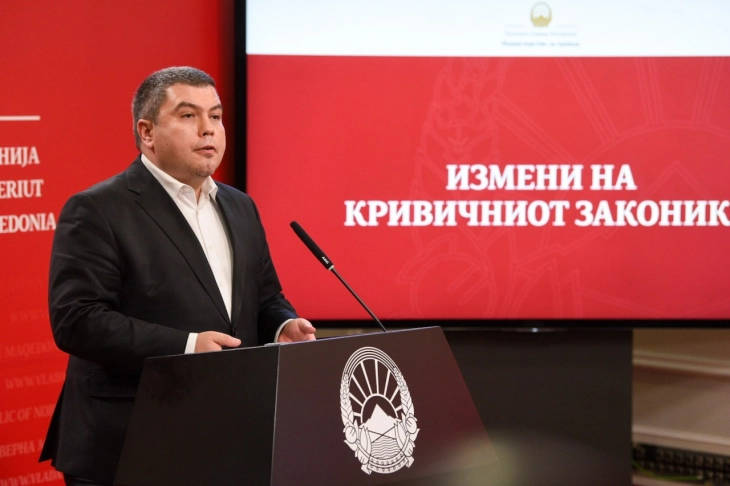Attack on journalists to be treated as attack on official, severe punishment to also be imposed for threat of attack on journalists
- Post By Nevenka Nikolik
- 17:50, 27 July, 2021

Skopje, 27 July 2021 (MIA) – Speaking at a press conference, Justice Minister Bojan Marichikj said the Government at a session on Tuesday adopted several amendments to the Criminal Code, the first of which refer to journalists. These amendments, he stressed, significantly increase the safety of journalists, as well as media workers in the country. Minister Marichkij expects these legal changes, which will be immediately forwarded to Parliament, to be adopted in September.
“In the future, attacking journalists will be treated as attacking an official. We’re also imposing severe punishment for a threat of attacking journalists. Additionally, in the future, the prosecution will act ex officio in such cases. This was a major demand of the Association of Journalists, whose representatives actively participated in the working group that prepared the amendments to the Criminal Code,” said Marichikj.
With these changes, Marichikj stressed, we’re putting an end to the possibility for past practices of impunity for violence against journalists, when journalists were intimidated, blackmailed, imprisoned, informally sentenced to life in constant fear of political and institutional retaliation for their professional work.
Thus, he added, with today’s amendments to the Criminal Code which refer to the work of media professionals, this Government shows that it has zero tolerance for any attempt to threaten freedom of speech and expression.
The Justice Minister once again urged all other institutions in the country, the prosecution and the courts, to act as promptly and professionally as possible in all cases of attack on media workers.
In addition, Marichikj said, the Government also passed amendments to the law on civil liability, which include significant reduction of the amount that journalists or media are to pay in case of losing a dispute over defamation or insult.
“Journalists in the future will pay a maximum of EUR 400 for defamation and insult, unlike in the past when this amount was EUR 2,000. For editors, in line with the changes, this amount should not be higher than EUR 2,000. As a reminder, under the current law it is EUR 10,000. For the legal entities, on the other hand, the amount is reduced from EUR 15,000 to a maximum of EUR 5,000,” Marichikj noted.
Addressing the reporters, he stressed that their role in society is pivotal.
“In order to be a corrective, you need to have maximum legal protection. This is a long-standing issue for us and that is why we do everything we can to protect you. These changes are precisely in that direction. If there is a need for additional adaptation or clarification of the legislation, we will do it in the future,” Marichikj said.
At Tuesday’s Government session, several amendments to the Criminal Code, the law on civil liability, as well as amendments or new legal texts in several other areas were passed in order to strengthen the efficiency of justice, the rule of law and accelerate reforms in the judiciary.
According to Marichikj, several legal changes have been addressed to provide for quality and a shift in the delivery of justice on issues over which nothing has been done for decades.
The Justice Minister also mentioned the case of the Telegram group chat “Public Room”, which involved female victims exposed to online abuse. These amendments to the Criminal Code, Marichikj noted, introduce changes to ensure the protection of women against sexual and other forms of harassment.
The amendments also provide for additional protection for women, arising from the Istanbul Convention, which North Macedonia signed in 2011 and ratified seven years later. With the changes arising from this convention, Marichikj said, women are legally protected against any kind of violence.
The Government on Tuesday also adopted several other legal documents, including the law on the fund for victims of crime, the law on civil procedure, the law on advocacy, the law on the academy for judges and prosecutors, etc.
These changes, Minister Marichikj said, are to strengthen the rule of law and speed up the much talked about judicial reform.







